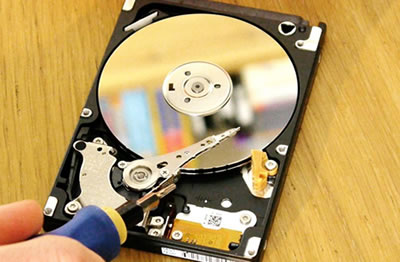Data Recovery
 Most of the digital information in the whole world is stored on the desktop hard drives. When a mechanical shock happens, hard drives may experience damage caused by the read/write heads dropping down onto the moving platters. Normally these heads float on a thin layer of air over the spinning platters, but if a shock happens and the two do come in direct contact, the heads can literally become “glued” to the plates. When this does happen, the heads can only be “unglued” from the plates by a trained engineer using special equipment.
Most of the digital information in the whole world is stored on the desktop hard drives. When a mechanical shock happens, hard drives may experience damage caused by the read/write heads dropping down onto the moving platters. Normally these heads float on a thin layer of air over the spinning platters, but if a shock happens and the two do come in direct contact, the heads can literally become “glued” to the plates. When this does happen, the heads can only be “unglued” from the plates by a trained engineer using special equipment.
Also, regular desktop hard drive platters are not a subject of full media certification. The times when you could run low level format on your drive are gone. Modern manufacturing process accepts some percentage of bad sectors, which are placed in a so called “P-list” at manufacturing time and are skipped by the hard drive during regular operation without involving the file system software.
High-capacity hard drives use three or more magnetic disks, or platters. Because of this, the most common failure is a wedging of the drive’s axle. The additional platters increase the load on the axle, and the resultant physical stress often leads to premature motor failures. With high-capacity hard drives a drop of only 4 inches can be enough to wedge the axle, which will first manifest itself through increasing hard drive noise and vibration. Some hard drive vendors’ designs make drives particularly vulnerable to such shocks and pressure. For example, when vendors Don’t secure the hard drive axle with a separate screw to the drive cover then any pressure exerted on the housing or cover can actually shift the axle, resulting in it changing its angle, and then damaging the platters.
No matter the cause of data loss, accidental, mechanical, or environment related damages, our team of recovery engineers have the capability and skills to make things right.
Apart from what is listed above, we also recover data from all types of desktop failures and situations, including:
- Deleted or lost partitions / files (e.g. e-mails, Outlook PST files etc.).
- Accidental formatting of storage media.
- Damaged or corrupted data stored on various storage devices.
- Data from extensively physically damaged storage devices (e.g. Open drive recovery).
- Corrupted Microsoft Office documents and Outlook PST files.
- Virus-damaged files.
- Hardware recoveries: Open drive recoveries.
- The drive no longer recognised by the BIOS after rebooting, despite the platters spinning.
- Operating system not found / missing operating system.
- Controller failure.
- Inaccessible boot device.
- Device won’t boot.
- The drive reports bad sectors.
- Single and multiple drive failure.
- Primary hard disk failure.
- Desktop BIOS recognises the drive but with “rubbish” parameters.
- Desktop BIOS recognises the drive but the data is inaccessible.
- Multiple drive or component failure.
- Device not ready.
- Corrupted data drive.
- Clicking or grinding noises, normally associated with electro-mechanical failure.
- Improper drive or media replacement.
- NTLDR is missing.
- Accidental/intentional deleted partition.
- Corrupt data.
- Fire/Water Damage.
- Formatted, Fdisked, partially re-loaded hard disk drives.
- Media surface damage.
- Logical and Physical Damage
- Hard Disk Failure
- Dropped laptop or other physical shock
- Spilled water or any other liquid
- “Disk Boot Failure”, Blue Screen and other error messages
We offer Data Recovery on the Following Laptop Systems & Hard Drives Acer, Apple Mac, Compaq, Dell, Digital, Fuji, Fujitsu, Hitachi, HP, Integral Peripherals, IBM, JTS, JVC, Kalok, Kyocera, LaPine, Laptech, LG, Maxtor, Mecer, Micropolis, Microscience, Miniscribe, NEC, Priam, Procomm, Quantum, Samsung, Seagate, Sony, Tandon, Toshiba, Tulin, Western Digital, unbranded drives and systems.
Acer, Apple Mac, Compaq, Dell, Digital, Fuji, Fujitsu, Hitachi, HP, Integral Peripherals, IBM, JTS, JVC, Kalok, Kyocera, LaPine, Laptech, LG, Maxtor, Mecer, Micropolis, Microscience, Miniscribe, NEC, Priam, Procomm, Quantum, Samsung, Seagate, Sony, Tandon, Toshiba, Tulin, Western Digital, unbranded drives and systems.
Laptops have become popular device for personal computing and their usage is growing at a rapid rate because of their portability, which happens to be their main advantage, however laptops are subjected to a lot of various conditions and abuse.
The tough conditions that laptops must function under make laptops more vulnerable to crashes and data loss when compared to desktops, also the amount of data stored on them is mostly critical which means that the consequences of data loss on laptops are more devastating when compared to desktops.
The data recovery processes for laptops is quite similar to the ones used to desktops.
Our data recovery lab technicians and engineers are a highly skilled team of trained and experienced in the latest state-of-the-art data recovery techniques with years of successful recoveries experience behind them which is lacking with any other data recovery company.
To recover data from all the above mentioned cases we follow a standardized data recovery process in all our data recovery labs across the globe.
